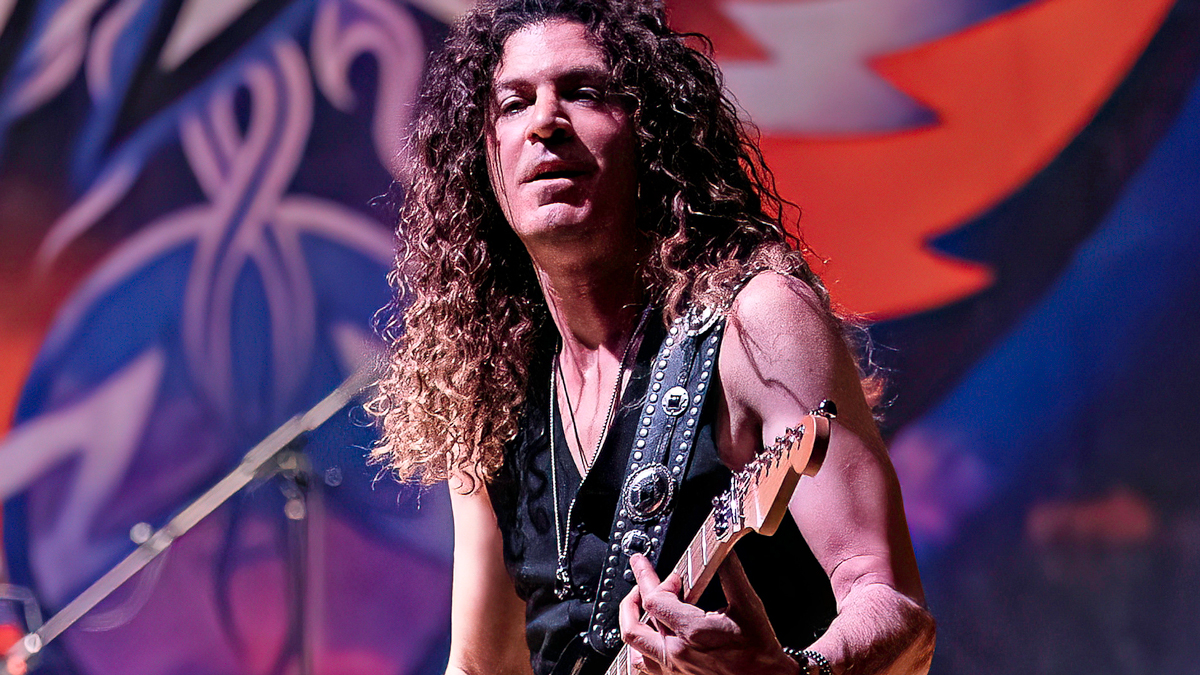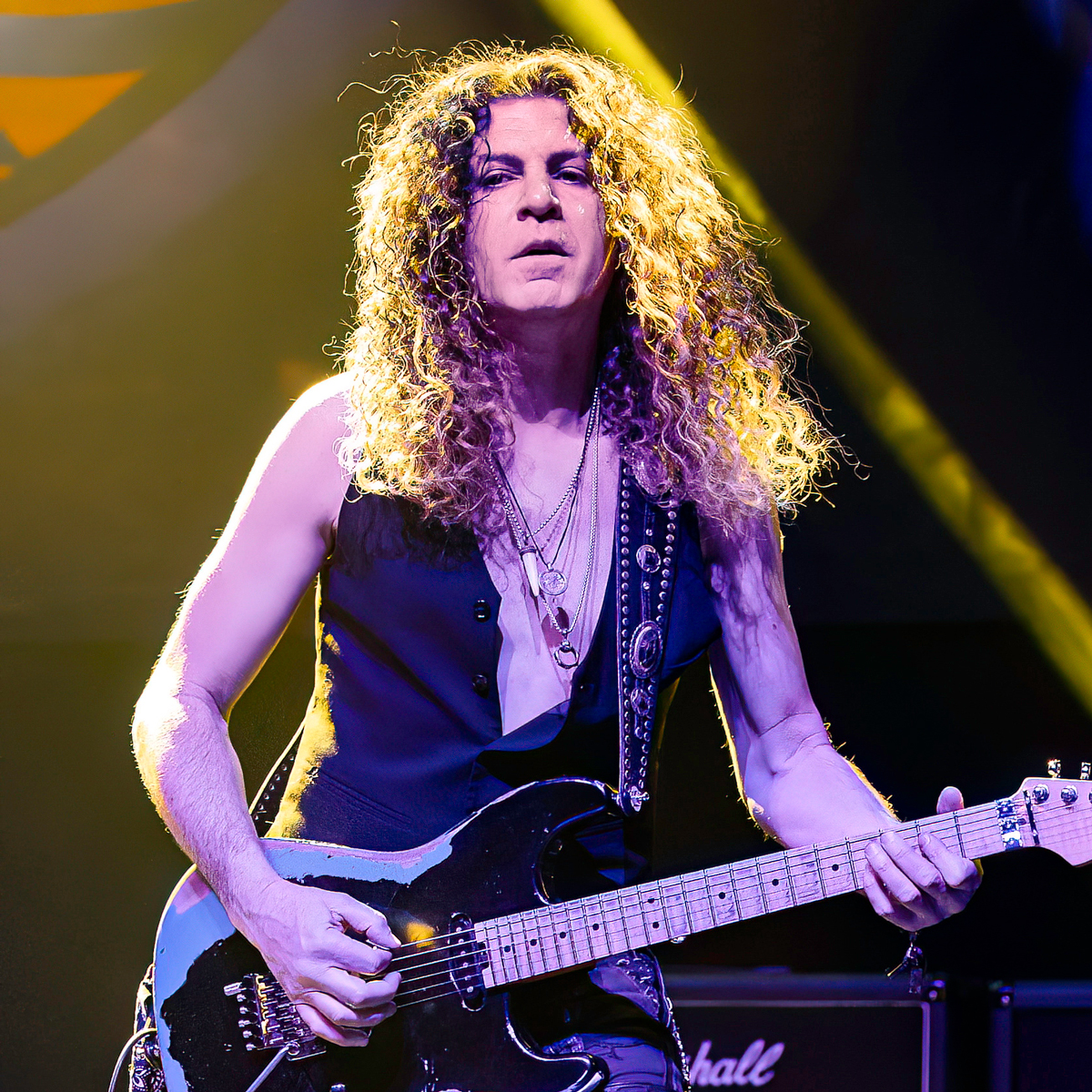“Jeff Pilson called me and asked if I would play some solos. I had no idea it was for Dokken – I was still in a suit and tie from work that day!” Jon Levin has been shredding with Dokken since ’97 – and has to tackle George Lynch’s scariest solos
After 25 years with the heavy metal stalwarts, Dokken's longstanding guitarist details his surprise induction into the group, why you'll find a Danelectro on most of his recorded tracks, and how he captured “lightning in a bottle” on the band's first album in 11 years

Despite Jon Levin's 20-year presence in Dokken, it’s the ESP-wielding pyrotechnician George Lynch who most often comes to mind when people think of the band. The truth is that Lynch hasn’t been a full-time member of Dokken since ’97.
Although Lynch recently sparked rumors by appearing during the encores of Dokken shows, Jon Levin has been holding things down since 2003. And he’s been so explosive that, if not for those encores, some might not remember Lynch at all.
You might assume that carrying the torch for Dokken would be uncomfortable – but Levin doesn’t think so: “It’s not been difficult dealing with George Lynch comparisons,” he says. “George is one of my favorite players and earliest influences, so it’s a nice compliment.”
He adds: “The hardest George Lynch-era part for me to play and execute is the solo in Tooth and Nail. It’s a really long solo and a lot to memorize. Fortunately I learned it at a much younger age when my memory was a lot better!”
Asked how he deals with points in the set where Lynch’s licks give him problems, Levin explains: “The way I learn is sequential; in other words, I know the entire solo only as one long sequence. It’s the same with the solos in Dream Warriors and The Hunter.
“If I were to miss one part at any time in any of these solos, I would probably lose the entire remainder from that point on, especially in Tooth and Nail because it’s so fast. I usually play some of those three solos in the dressing room before we go on stage.”
In support of Dokken’s first record in over a decade, Jon Levin dialed in with Guitar World to recount the recording of Heaven Comes Down and the gear he deploys live and in the studio.
Get The Pick Newsletter
All the latest guitar news, interviews, lessons, reviews, deals and more, direct to your inbox!
You've been with Dokken for around 20 years, right?
“One day in 1998, Jeff Pilson called me and asked if I would play some solos. I was at my father’s house for dinner, and he convinced me to go down and play. I didn’t want to, because I hadn’t played much guitar for years. I had a record label and a law practice.
“I had no idea it was for Dokken – or, frankly, I never would have gone! When I went to the studio, to my surprise, the whole band was there. I was still in a suit and tie from work that day!”
Did you get along with Don Dokken right away?
“I remember Don opened the studio door, handed me a guitar, and told me to play. I played a solo on the demo for what later became Maddest Hatter and on one called Irish Song, released as a bonus track in Japan. A few weeks later, Jeff called and asked if I could play a show at the Dallas Starplex with the band on July 4, 1998, which I did.”
You dealt with some physical issues recently. Did that impact your playing?
“It’s not so much that I suffered an injury – it’s that I was born with extra ribs. They cramp the space in my neck and make things somewhat more difficult for me. I’ve had a few taken out, but I’m hoping to avoid having more taken out if possible.
“That issue came to light right after the Broken Bones record was released. Don was also suffering from his medical problem at the time, so we both had to get ourselves sorted before we were able to move on.”
Dokken’s latest, Heaven Comes Down, is the band's first album in 11 years. How did things kick off?
“it’s the culmination of Don and I collaborating for 20-plus years. It’s everything I would hope to have in a Dokken album. Don’t get me wrong – I like a lot of the other material we did, but this one, for some reason, was lightning in a bottle and just a bit more special. The songs on this album could have been on the albums back in the ‘80s, but they’re not ripoffs of any of those old songs.”
Can you pinpoint why things fell into place this time?
“The songs are unique in themselves. For whatever reason, the stars, sun, and moon aligned for us, and we ended up with a great album. A lot can go wrong during the recording process, and just because you finish a recording and think the tracks sound great doesn’t mean it will be great in the end.
The songs on this album could have been on the albums back in the ‘80s, but they’re not rip-offs of any of those old songs
“I wasn’t happy with how Broken Bones ended up, sonically speaking; although it’s a great album, the mastering made it sound unlike it did when Don and I were listening to the recorded tracks.”
With Don unable to play guitar due to his arm injury, does that put more pressure on you?
“It didn’t necessarily, because it was during COVID, and I had so much time to spend in my studio writing. As a result, I wrote a vast amount of material. The overall process was different because Don and I had to write independently.
“In the past, of course, with Don able to play guitar when we collaborated, it would be easier for him to express an idea to me. On this one, I wrote complete musical tracks and sent them to Don, and after the pandemic, Don came to my studio to work.”

Tell us about the guitar you deployed while recording Heaven Comes Down.
“I have always stuck to Fender, Gibson, and Charvel. I have several guitars that I use just for recording as my go-to guitars because they will work for a particular sound I’m looking for.
“My recording guitars are an old Les Gothic Paul from 1990, an old Danelectro 12-string, a stock Fender Stratocaster, my black and white Charvel, and my Palermo Strat.”
And how do you decide between those?
“I use the Danelectro primarily for a clean tone that underpins my rhythm. It usually makes its way onto most of the tracks on the record, so anytime you hear a clean sound, it’s probably my Danelectro. I can get any sound I’m looking for from these instruments, and I rarely need to find something that these can’t collectively do.”
Is your live setup the same?
“For live, I rotate between four or five different Charvel guitars, depending on which one feels best. My touring rig today consists of two Marshall JCM2000 DSL100 heads in stereo that have a stereo delay and stereo chorus. I have a third Marshall head in the middle that’s dry. All heads have my Body Blow gain booster pedal in front of the amp.
“In essence, two cabinets on the outside are in stereo, and the middle cabinet is dry. For the middle head I use a JCM900, so the total rig is two JCM2000s in stereo and one JCM900 dry. All my heads are modified. The JCM900 sounds like no other JCM900 I've ever heard.”
I don’t think achieving a final goal as a musician is possible. I keep trying to improve
What sets it apart from the pack?
“It sounds much more like a hot-rodded old Plexi. I used that amp to re-record the Lightning Strikes record. That entire record is my JCM900 head with a Marshall cabinet and a Tube Screamer with my tobacco Sunburst Charvel, which has a flame maple top, an ebony fretboard and a poplar body.
“I don’t play that guitar live, because it weighs a ton. When we do fly dates, I use a rented JCM2000 DSL100, and I bring a pedalboard with a Boss chorus, Boss DD-500 delay, and the Body Blow gain boost pedal. I stopped using a Tube Screamer TS9 live because I broke too many.”
What are your goals for Dokken and personally as you move forward?
“To keep playing music, which I hope will inspire people. Music can be a bright spot in what can sometimes be a cold world. I don’t think achieving a final goal as a musician is possible. I keep trying to improve.”
- Heaven Comes Down is out now via Silver Lining Music.
Andrew Daly is an iced-coffee-addicted, oddball Telecaster-playing, alfredo pasta-loving journalist from Long Island, NY, who, in addition to being a contributing writer for Guitar World, scribes for Bass Player, Guitar Player, Guitarist, and MusicRadar. Andrew has interviewed favorites like Ace Frehley, Johnny Marr, Vito Bratta, Bruce Kulick, Joe Perry, Brad Whitford, Tom Morello, Rich Robinson, and Paul Stanley, while his all-time favorite (rhythm player), Keith Richards, continues to elude him.
“There’d been three-minute solos, which were just ridiculous – and knackering to play live!” Stoner-doom merchants Sergeant Thunderhoof may have toned down the self-indulgence, but their 10-minute epics still get medieval on your eardrums
“There’s a slight latency in there. You can’t be super-accurate”: Yngwie Malmsteen names the guitar picks that don’t work for shred





![A black-and-white action shot of Sergeant Thunderhoof perform live: [from left] Mark Sayer, Dan Flitcroft, Jim Camp and Josh Gallop](https://cdn.mos.cms.futurecdn.net/am3UhJbsxAE239XRRZ8zC8.jpg)







